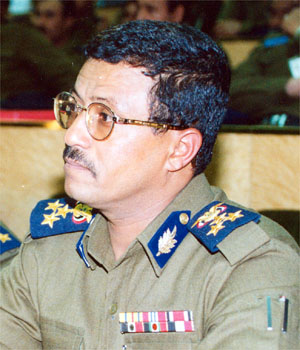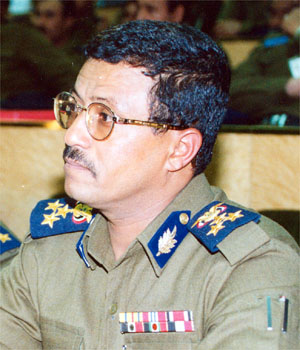
Mr. Brigadier General Ali al-Shamiri to YT: “Statistics reveal that there was a marked decrease in crimes reported in year 2000 as compared to those of the year 1999.” [Archives:2001/07/Interview]
February 12 2001

Should the government not address the situation properly through improving the security apparatus, improving the living conditions of its employees, it is certain that things will worsen. The people hear a lot about well-drawn security plans to tackle the situation. However, this completely clashes with the reality.
It has become of heightened importance to improve and develop security plans. Transparency and credibility have also become a pre-requisite within the security apparatus to rectify the problem.
YT met with Brigadier general Ali Mansoor al-Shamiri, public relations chairman and first guiding and information officer in the Interior Ministry. Mr. Ali was born in 1955, Makbanah, Shamir, Taiz governorate. He graduated from the Police Faculty in 1977 and finished his higher studies in 1992. Mr. al-Shamiri is also the chief editor of al-Hurass, mouth-piece of the Interior Ministry. A YT reporter discussed with him many issues of major public concern.
Q: What are the reasons behind the security lapses? How can the situation be rectified? What plans does the Ministry have to correct the situation?
A: I do not agree with the idea that there is a wide-scale security lapse in the country. If that was the case, it would mean that people would leave the country and wouldn’t stay here. The fact is that people’s worries and fears increase, with partisan and national media exaggerations blowing things up out of all proportions. Obviously it is difficult to stop these newspapers from doing so.
Nobody can claim that crime does not exist. It’s a social phenomenon to be found in all countries and in all societies. It’s not only restricted to our community. In fact, we can safely say that the crime rate in our community is the lowest in all the world.
There are indirect reasons for the epidemic of crime in our society. Changes taking place in the social structure of the community due to economic changes that happened during the 1990s have something to do with the increase of crime as they led to manifold negative economic and social phenomena among some sections of the society.
The realization of classes in society and the fading away of the middle class has also given rise to this phenomenon which may grow and become bigger. The proliferation of weapons among Yemenis is another reason behind the increase in crime.
Q: What restrains the Ministry of Interior from taking serious and strict measures to ban the proliferation of arms at least in the main cities?
A: The Ministry has applied theoretical and practical plans to ban the carrying of arms in the main cities. To some extent they were successful. Besides, this is not a-one sided issue that can be controlled by the Ministry alone. This needs the cooperation and understanding of all. Private guards are a part of this phenomenon and give the impression that arms are frequently carried inside main cities.
Q: What are the statistics of crimes reported for the year 2000 in comparison with those for the year 1999?
A: Statistics reveal that there was a marked decrease in crimes reported in year 2000 as compared to those of the year 1999. The total number of crimes reported in 2000 was 10264 while in 1999 it was 11316. In the capital secretariat alone there were 3263 crimes at a rate of 31.79%. The number of accidents reported was 6771 and there were 45858 traffic violations. In 1999 the number of crimes, accidents and breaches of traffic laws reached 48655.
Q: How do you view the rampant corruption in police stations and the ever-increasing incidence of bribes?
A: Corruption is rampant and is attributed to the poor living conditions of security men. The Interior Ministry can not deal with this alone. Rather this should be dealt with by a comprehensive plan put forward by the government.
If any person is mistreated by any security officer in any police station, he has the right to have him tried by submitting a letter of complaint to the Monitoring and Inspection Department in the Interior Ministry, or by filing a case against him in the courts. Violations exist and no one can deny them. However, the violators are punished for their crimes. National newspapers bear testimony to the fact that this actually happens.
Q: How do you explain the ineffectiveness of the Ministry’s media operations in raising people’s awareness of laws and regulations?
A: Let me in the first place note that the people actually reading newspapers and listening to the radio in our society are a tiny minority. Citizens are not aware of many of their rights and duties and this ignorance is the reason behind many problems. It is not easy to overcome this situation in the short term. We are counting a lot on the educated next generation to lead the move for change in this country.
The Ministry is doing its best through its available media organs to promote and develop the security and cultural awareness of its employees. This has actually borne fruit and the man in the street certainly feels the difference between today and yesterday. We do keep following things up and check public opinion on security matters and on many other issues. We also launch awareness promotion programs in many official newspapers and in ministerial institutions. Positive and negative features that we came across are all reported to the departments concerned in the Ministry so as to prevent their occurrence.
Q: How can trust between the people on the one hand and security men and security apparatus on the other hand be regained?
A: This crisis of trust is an issue that can never be generalized. This is very much associated with people’s background. The more their awareness is developed, the more they become aware of their rights and duties. This will also take a lot of time. However, I am quite optimistic about the future.
Q: How do you explain the inefficiency of the fire brigade?
A: The fire brigade should be an independent institution not affiliated to the Ministry of Interior. I believe that this body should be reconstituted so as to work more effectively. It’s resources now are very limited and thus, the fire brigade’s role at the moment is restricted to extinguishing fires. The problem facing the fire brigade in the capital, for instance, is that streets are not numbered and there are not specific names known to all people. If such things were available then we could prepare a map of the capital through which we would be able to pinpoint the location of any fire. This does not mean that there are not positive things in this body. However, as is always the case, negative phenomena are more dominant in people’s minds.
Q: What is the role of patrols and night check points?
A: Patrols have a role of prime importance, if they carry out their duties according to the law. Their job is to respond to any call for help or to check any report of problems or violations.
Check points at nights are also important to ensure citizen’s security. There is nothing better than to feel that there are other people who are taking care of your security. Besides, these check points are to limit the carrying of weapons and to arrest outlaws.
Q: It is widely reported that putting off judiciary verdicts for too long has led to an increase in the crime level. How do perceive that?
A: Putting off judiciary verdicts leads some people to disrespect the courts. Consequently, they are sometimes not restrained from doing wrong as they feel that punishment is very unlikely. However, this matter is not the concern of the security forces alone but also that of the judicial system.
Q: What is the future of recruiting women to the security forces?
A: I am quite optimistic. I pin high hopes on the government supporting this project with more facilities such as accommodation, proper environment and other guarantees, so as to avoid any setbacks.
——
[archive-e:07-v:2001-y:2001-d:2001-02-12-p:./2001/iss07/intrview.htm]


